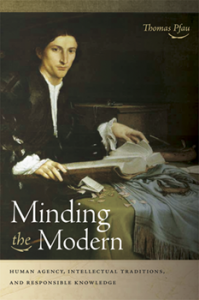Thomas Pfau’s book Minding the Modern is a book of immense scope. About half the work (parts II and III) consists…
Minding the Modern

Thomas Pfau’s Minding the Modern offers its readers one of the most substantial historical discussions now available on the relationship between human will, intellect, and reason. From Plato all the way to Aquinas, argues Pfau, the human will and intellect were essentially subordinated to a divine form of reason that pervaded the cosmos. Both worked in tandem to apprehend and participate in reason.
Yet starting with the work of William of Ockham in the late medieval period, a slow revolution took place that called into question humans’ cooperative social nature by making the will or intellect wholly dominant, and construing the lesser one as being epiphenomenal. The self-assertion of will or intellect over the good or divine left modernity completely devoid, so Pfau maintains, of the conceptual tools and contemplative practices necessary for generating deep sources of human meaning. Seduced by the apple of secularism, the modern self overcame the divine but only at the cost of forfeiting the “plentitude of past meaning”’for a pernicious case of arrested development.
Hence Pfau’s damning verdict that the modern secular world suffers from a “condition of progressive amnesia, which in turn results in an increasingly stunted outlook of human agency.”
Losing sight of reason
Thomas Pfau has created a brand new narrative, not a scholarly book. In the best Christian traditio renovanda (renewing tradition),…
Stacking the deck: Thomas Pfau’s strange history of the West
Imagine that you’ve been invited to play a game of cards with Thomas Pfau and his cards are called Justice,…
Ancient questions for modern answers
The central contrast in Thomas Pfau’s rich and rewarding book, Minding the Modern, is between two radically opposed views of…
Minding the other modernities
Let me start with a confession. I am not particularly keen on stories of modernity in which “modernity” figures as…
Thomas Pfau and the emergence of the modern individual
Here I will argue that Thomas Pfau’s presentation of modernity in Minding the Modern fails to incorporate both the sociopolitical…
Playing God
In his new book Minding the Modern, Thomas Pfau presents a searching, and often scathing, indictment of the modern regime…
Minding hermeneutics and history
Minding the Modern is unusual in several respects. It is organized historically but anti-historicist, methodologically self-aware yet critical of “method,”…
Modernity as a hermeneutic problem
I should thank the organizers at The Immanent Frame for hosting a forum on Minding the Modern and all respondents…
The Fantastic Mr. Hobbes
Some readers of Minding the Modern have been surprised to find my account so firmly critical of Thomas Hobbes on will…












